As someone who’s tested dozens of tools over the years, I can confidently say that free CRM software has come a long way. In 2026, you don’t need to spend big to access powerful features like contact management, sales tracking, workflow automation, and even marketing tools.
In this curated list, I’ve handpicked 7 standout CRM tools that offer real value—for exactly $0. These aren’t just freemium placeholders. They’re full-featured solutions that can help you boost sales, nurture leads, and run smoother operations.
Whether you’re a startup founder, freelancer, or small business owner, these CRMs deliver performance without the price tag.
Let’s explore the top CRM systems that are free to use and find the one that best fits your growth goals.
Why Your Business Needs CRM Software in 2026
Whether you’re a startup, freelancer, or established small business, investing in a CRM (Customer Relationship Management) system is no longer a luxury—it’s a necessity.
Here’s why:
- Centralize customer interactions across email, chat, calls, and social media in one platform
- Boost sales productivity by tracking deals, automating tasks, and managing your pipeline efficiently
- Make data-driven decisions with real-time insights on customer behavior and performance
- Deliver personalized experiences using customer history, preferences, and engagement data
- Scale operations smoothly by staying organized even as your customer base grows
- Automate workflows to save time and reduce manual errors in daily processes
- Future-proof your business by meeting rising customer expectations with speed and consistency.
If you’re interested in tools that go a step further with predictive insights and automation, check out this blog on AI CRM.
My Top 3 Picks for Free CRM Software
To simplify things, I’ve listed my top three picks right here. Check them out!
Option 1: BIGContacts
BIGContacts is ideal for startups and SMBs looking for free customer relationship management and aiming to boost customer relationships by enhancing contact management and email marketing.
Its user-friendly interface supports easy customization and integration, facilitating efficient communication through automated email campaigns and streamlined team activities.
Option 2: Zoho CRM
Zoho CRM is tailored for businesses looking to interact seamlessly with customers across multiple platforms, such as email, social media, phone, and live chat.
It ensures consistent and effective communication, which is integral for businesses aiming to reach customers through their preferred contact methods.
Option 3: Insightly
Insightly is an effective CRM platform that integrates seamlessly with project management tools. It is especially suitable for businesses managing multiple projects and needing efficient task organization.
The platform facilitates handling all aspects of customer relationships and project execution within a single system, simplifying processes and enhancing efficiency.
List of the Top 7 Free CRM Software
Here is a detailed review of the features and pricing of the seven best free CRM software programs.
| CRM Tool | Best for | Pricing |
|---|---|---|
| BIGContacts | Contact Management & Email Marketing for Startups & SMBs | Forever free for small teams. Paid starts at $9.99/month |
| Insightly | Project-Oriented Businesses | Free for 2 users. Paid plan starts at $29/user/month. |
| Zoho CRM | Omnichannel communication | Free for 3 users. Paid starts at $14/user/month. |
| HubSpot CRM | Centralized Sales, Marketing & Support | Free for 5 users. Paid starts at $15/month/seat. |
| EngageBay | Marketing & Workflow Automation | Free for 15 users. Paid starts at $13.79/user/month. |
| Bitrix24 | Team Collaboration & Online Workspace | Free plan available with limited storage and features; paid options start at $49/month for 5 users. |
| Capsule CRM | Automated Data Entry | Free for 2 users. Paid starts at $14/user/month |
1. BIGContacts – Best for Contact Management & Email Marketing for Startups & SMBs
Ideal for: Small teams and startups needing simple, scalable contact management with email automation.
BIGContacts is a user-friendly CRM designed for small-to mid-sized businesses that want a simple way to organize contacts, automate follow-ups, and manage customer relationships more effectively.
In my experience, this CRM offers just the right balance between functionality and ease of use. It simplifies everyday workflows—from scheduling meetings to sending personalized drip emails—without overwhelming you with features you don’t need. The interface is clean, and the ability to customize fields, views, and reports helped me tailor it to different types of campaigns and sales workflows.
One standout feature is its smart reminders and task automation. With minimal setup, I was able to build a consistent follow-up system that ensured no lead or customer slipped through the cracks. It’s especially helpful for teams that need to stay organized without hiring a full-time CRM manager.
Pros:
- Keep contact data organized using custom fields, list filters, and smart tags
- Manage your sales pipeline visually with an intuitive drag-and-drop interface
- Launch automated email sequences based on triggers like lead source or activity
- Automate tasks, meeting reminders, and follow-ups to stay on top of every opportunity
- Capture leads directly from your website using embeddable forms linked to the CRM.
User Ratings:
- G2 Rating: 4.5/5
- Capterra Rating: 4.3/5
User Review:
“I love the user-friendly interface and the ease of use. It allows me to see any updates regarding clients and allows my coworkers to stay up to date on tasks and important information.” – Kristan (Capterra)
Pricing:
Forever free for small teams. Paid starts at $9.99/month.
2. Insightly – Best for Project-Oriented Businesses
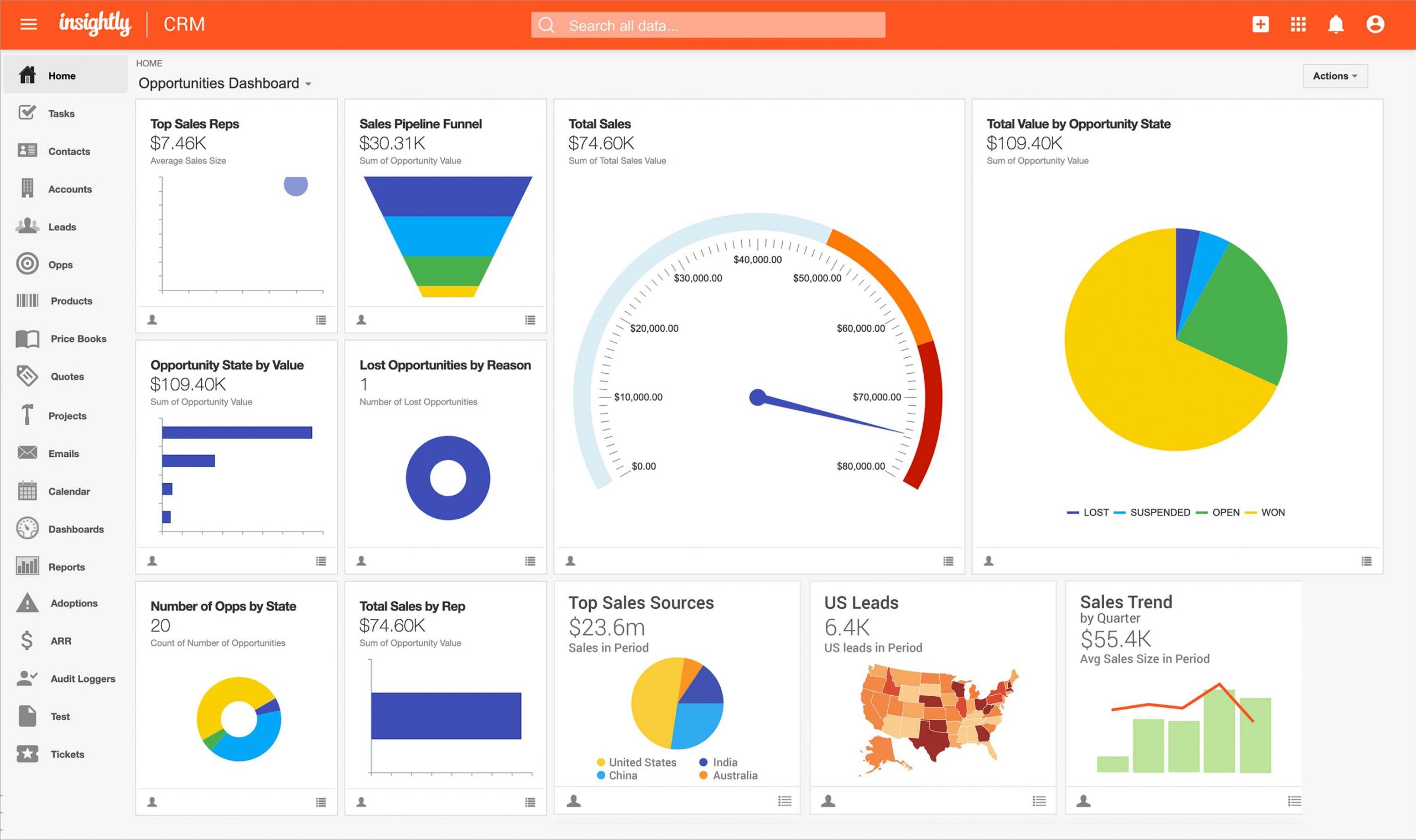
Image Source: Insightly
Ideal for: Service-based businesses managing client projects and needing CRM + project tracking in one place.
When I used Insightly, I found it especially helpful for managing client relationships and internal projects in one place. Unlike traditional CRMs, it allowed me to track customer interactions and link them directly to tasks, deals, and project milestones, keeping everything organized and transparent.
The visual pipelines and relationship mapping made it easy to understand how contacts, tasks, and projects were interconnected. I could assign responsibilities, set deadlines, and monitor progress—all while keeping the customer journey at the center. This really helped my team stay aligned, especially when juggling multiple client accounts.
That said, some of the more advanced features required a paid upgrade, which might not work for smaller teams with limited budgets. Still, if your business handles project-heavy workflows and needs a CRM that supports that complexity, Insightly was one of the most comprehensive options I came across.
Pros:
- Unified platform for managing contacts, tasks, deals, and projects
- Visual mapping between contacts, organizations, and workflows
- Custom automation for lead routing, task creation, and pipeline progression
- Strong project tracking features with built-in timelines and dependencies.
User Ratings:
- G2 Rating: 4.2/5
- Capterra Rating: 4.0/5
User Review:
“As our organization grows and changes, we need to shift how we use our CRM. We love being able to add custom fields. The integrations are many. Collection of contact info from Outlook saves a lot of manual data entry. Exporting and importing data for use in other platforms, and/or reporting to pare down what is there for those on the team without access to the CRM.” – Jen A. (G2)
Pricing:
Free for 2 users. Paid plan starts at $29/user/month.
3. Zoho CRM – Best CRM for Omnichannel Engagement
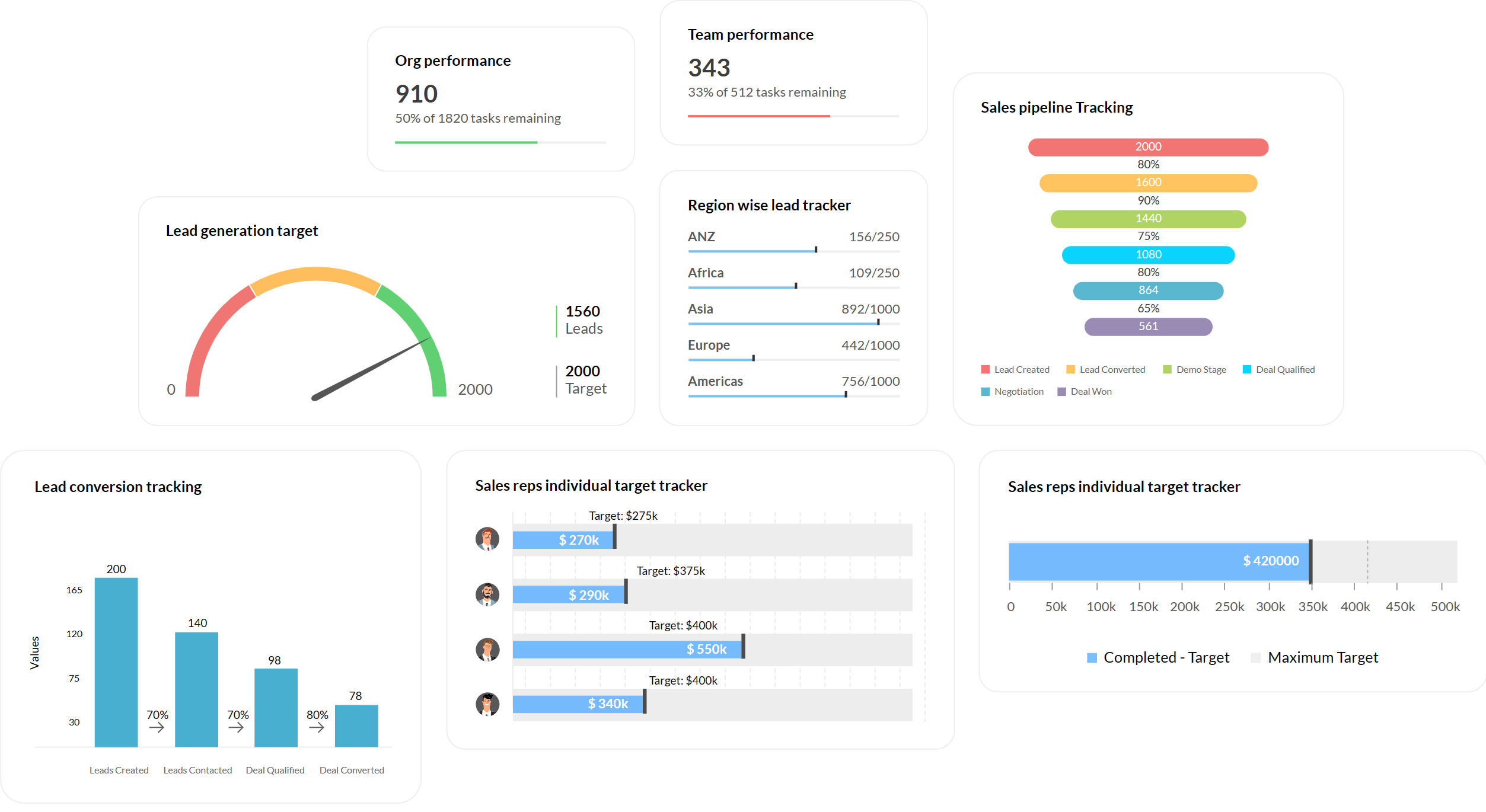
Image Source: Zoho
Ideal for: Growing businesses seeking omnichannel communication across email, social, chat, and more.
Zoho CRM is a versatile platform that enables businesses to interact with customers across multiple channels, including email, social media, phone, and live chat. This ensures consistent and effective communication, which is crucial for engaging customers through their preferred mediums.
In my experience, Zoho CRM’s integration capabilities stood out, allowing seamless synchronization of client interactions across various platforms. Its compatibility with the broader Zoho suite further enhances its utility, providing a comprehensive system for managing customer data and improving interaction outcomes.
However, I found that for startups or smaller teams, the initial setup and customization could be complex, potentially slowing down the onboarding process. Additionally, while the platform offers extensive features, some third-party integrations may incur extra costs, which could impact budget considerations.
Pros:
- Integrated communication tools for consistent customer interactions across various touchpoints
- Detailed analytics offering insights into customer preferences and behaviors
- Seamless integration with other applications within the Zoho ecosystem
- Zia, the AI assistant, provides predictive analytics and automation suggestions to aid decision-making.
User Ratings:
- G2 Rating: 4.1/5
- Capterra Rating: 4.3/5
User Review:
“I love how the search feature can find an account with just a few letters or numbers. Excellent search feature. I love the smooth messenger and all the features it comes with, including blocking reps from sending outside approved hours, and it will give you a pop-up and stop a text if you’re sending a duplicate to the same person. Just a high-quality CRM all around.” – Josh D. (G2)
Pricing:
Free for 3 users. Paid starts at $14/user/month.
4. HubSpot CRM – Best for Centralized Sales, Marketing & Support

Image Source: HubSpot
Ideal for: Startups and SaaS companies looking to unify marketing, sales, and support without switching tools.
HubSpot CRM offers a unified solution for managing sales, marketing, and support processes. This platform stands out for its intuitive interface and comprehensive tools that simplify complex operations, making it easier to maintain a holistic approach to customer management.
As I evaluated tools that could bring cohesion to various operational areas of my business, HubSpot’s CRM impressed me with its capability to integrate these functions smoothly. Its features facilitate better team alignment, ensuring that customer data flows seamlessly from one department to another.
However, while the basic features are free, scaling up with advanced tools and capabilities can become costly. Some users, particularly small businesses with simpler needs, may find the array of settings overwhelming.
Pros:
- Streamlined integration of sales, marketing, and support functions within a single platform, enhancing team collaboration and data accessibility
- Intuitive user interface that reduces the learning curve and increases adoption rates across departments
- Extensive customization options allow businesses to tailor the system to their specific needs
- A rich ecosystem of integrations with other software, expanding its functionality and utility.
User Ratings:
- G2 Rating: 4.4/5
- Capterra Rating: 4.5/5
User Review:
“The whole system is amazing and gives me flexibility and guidance at the same time. I am confident it is helping my business.” – Mitchell H (Capterra)
Pricing:
Free for 5 users. Paid starts at $15/month/seat.
5. EngageBay – Best for Marketing & Workflow Automation
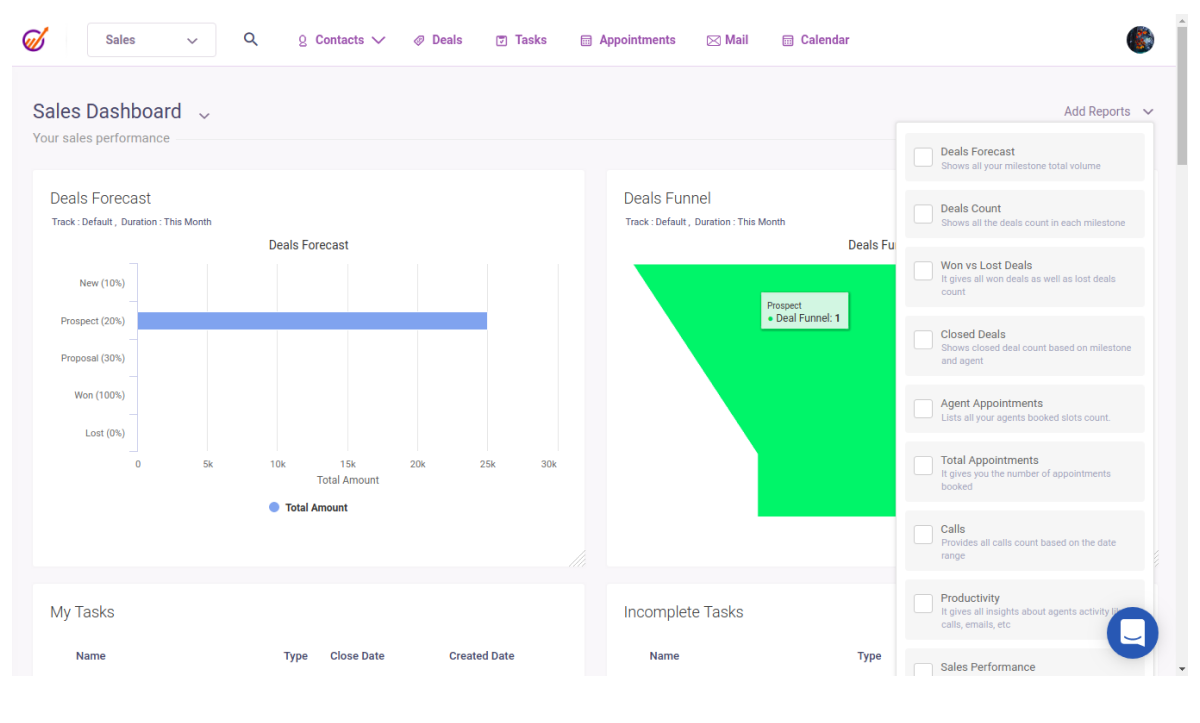
Image Source: EngageBay
Ideal for: Small marketing teams wanting to automate email campaigns and customer workflows on a tight budget.
EngageBay is an all-in-one CRM platform that combines marketing automation, sales, and customer support tools, making it ideal for small to medium-sized businesses seeking to streamline their operations.
In my experience, EngageBay’s automation capabilities significantly reduced the time spent on repetitive tasks. The platform’s intuitive design made it easy to set up targeted marketing campaigns, manage contacts, and track sales pipelines without the need for extensive training. Additionally, its seamless integration with other tools ensured that all aspects of customer engagement were connected and easily accessible.
However, I noticed that the free version has limitations, such as a cap on the number of contacts and emails, which might be restrictive for growing businesses. While the platform offers a range of features, some advanced functionalities are only available in higher-tier plans, which could be a consideration for budget-conscious users.
Pros:
- Comprehensive marketing automation tools for targeted campaigns
- User-friendly interface that simplifies task management
- Seamless integration with various tools, ensuring connected workflows
- All-in-one platform managing marketing, sales, and support.
User Ratings:
- G2 Rating: 4.6/5
- Capterra Rating: 4.7/5
User Review:
“I am very pleased with Engagebay as it is very easy to use and has great customer support. Their UI is very smooth and everything is well placed.” – Mike S (Capterra)
Pricing:
Free for 15 users. Paid starts at $13.79/user/month.
6. Bitrix24 – Best for Team Collaboration & Online Workspace
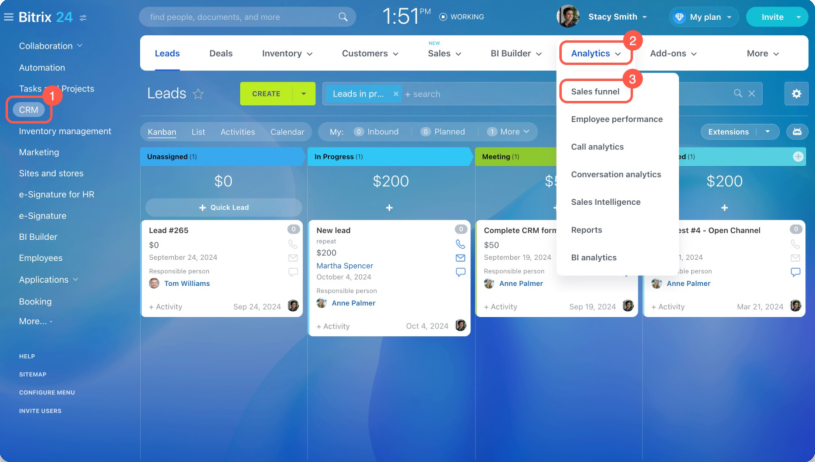
Image Source: Bitrix24
Ideal for: Remote teams and SMBs that need all-in-one operations, such as CRM, project management, chat, and more.
I found Bitrix24 to be a powerhouse for managing internal operations and customer relationships from a single platform. It combines CRM, project management, communication tools, and more, making it ideal for businesses that want to centralize their workflows without switching between multiple tools.
The CRM module stood out to me for its depth—especially the lead management and sales tracking features. I could easily customize pipelines, automate tasks, and assign follow-ups to different team members. It also offered solid support tools that helped maintain post-sale engagement with clients.
That said, setting it up took some time and patience. With so many features packed into one system, there was a learning curve initially, and performance occasionally slowed down during heavy use. However, once configured, it became a high-functioning engine for both sales and operations.
Pros:
- Unified management of tasks, communication, and customer data reduces the need for multiple platforms
- Comprehensive CRM tools cover all aspects of customer interaction, from lead management to post-sale support
- Customizable workflows allow for tailored automation, enhancing team productivity and efficiency
- A robust mobile app ensures team members can stay connected and productive from anywhere.
User Ratings:
- G2 Rating: 4.1/5
- Capterra Rating: 4.2/5
User Review:
“I consider Bitrix24 to be quite comprehensive, lightweight, and constantly evolving, allowing for a very high level of integrations via API. We use the CLOUD + APP version. Comparing the Bitrix feature offerings and its cost… It’s a very easy decision. The support service works very well. I emphasize that we use the Enterprise version. Bitrix is a tool that is constantly used and easy to use.” – Pedro G (G2)
Pricing:
Free plan available with limited storage and features; paid options start at $49/month for 5 users.
7. Capsule CRM – Best for Automated Data Entry
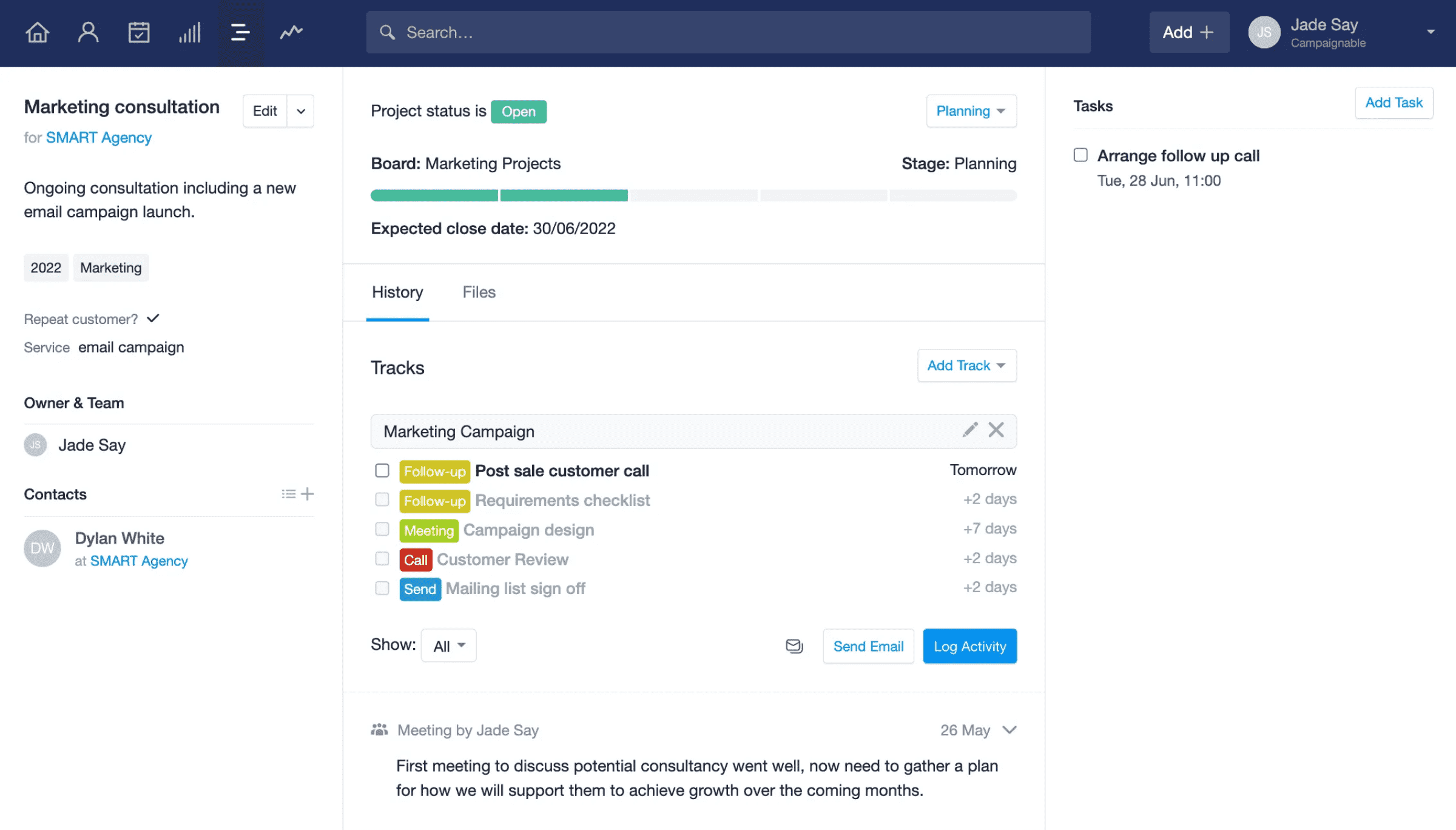
Image Source: Capsule
Ideal for: Freelancers and consultants managing up to 250 contacts who want an easy-to-use, no-frills CRM.
When I started using Capsule CRM, its clean and clutter-free interface stood out immediately. It pulled together all the essentials—emails, notes, calls, and files—into one central view, which helped me stay focused without switching between tools. It felt like a lightweight but smart solution for managing customer relationships with minimal setup time.
One of my favorite features was its real-time synchronization. Capsule automatically pulled data from integrated apps like Gmail and Outlook, updating contact records without any manual input. That saved me a lot of time and reduced the chances of missing important updates. The tagging system was also a quiet hero—it made sorting and finding contacts incredibly quick and intuitive.
Capsule worked best when I needed something simple, fast, and reliable. The search function made retrieving past interactions seamless, and the CRM felt very accessible—even for someone new to using such tools.
Pros:
- Efficient data entry processes that streamline capturing and updating contact information
- User-friendly interface that facilitates easy navigation and adoption even for CRM novices
- Customizable fields that allow you to adapt the CRM to your business’s specific requirements
- Seamless integration with tools like Google Workspace and major accounting software.
User Ratings:
- G2 Rating: 4.7/5
- Capterra Rating: 4.5/5
User Review:
“What I like best about Capsule CRM is its simplicity and ease of use, which makes it accessible to users of all technical skill levels. The user interface is clean and intuitive, allowing you to get started quickly without a steep learning curve or the need for extensive training.” — Matt C. (G2)
Choose the Right CRM for Your Small Business
When searching for the right CRM solution, it’s best to consider economical and efficient options. Free CRM systems cater to the basic needs of small businesses and individuals, providing essential contact management software for communication without overspending your budget.
However, to ensure that your CRM can grow along with your business, you need to invest in a low-cost and scalable CRM solution from the beginning. This approach can help you avoid the disruption of switching systems as your business requirements increase.
Before making any commitments, take advantage of the free trials available, such as the 15-day trial offered by BIGContacts. This will allow you to test the CRM’s features and determine its suitability for your business operations, ensuring that it can meet your current demands and accommodate future growth.
Frequently Asked Questions
What are the features available in free CRM software?
Free CRM software often includes core CRM functionalities such as contact management, deal tracking, task and event tracking, email integration and tracking, basic reporting, and lead management.
Some free versions also offer limited customization options, integration capabilities with other tools, and user access controls to manage team activities.
What are the benefits of a CRM system?
The benefits of a CRM system include improved customer relationship management through better communication tracking and historical data access, increased sales efficiency through streamlined sales processes, enhanced customer service, and retention.
Additionally, CRM systems provide valuable insights into customer behavior and business operations, helping in strategic decision-making and growth planning.
Watch: How CRM Software Helps in Improving Sales
How do you choose the best CRM software?
To choose the best CRM software, you need to assess your specific needs, including the size of your customer base, process complexity, and integration requirements. You should also consider scalability, ease of use, mobile access, and customer support.
Also, read reviews and try a free version or demo to ensure the software meets your needs and is user-friendly. To learn more, Watch the quick video tutorial below:
Who should opt for a free CRM option?
Free CRM options are ideal for small businesses, startups, and entrepreneurs who need basic CRM functionalities without a significant initial investment. These options are also suitable for businesses with limited customer interaction or those just beginning to structure their customer management processes.
Companies testing CRM systems to find the right fit before committing financially might also start with a free option.
FREE. All Features. FOREVER!
Try our Forever FREE account with all premium features!







